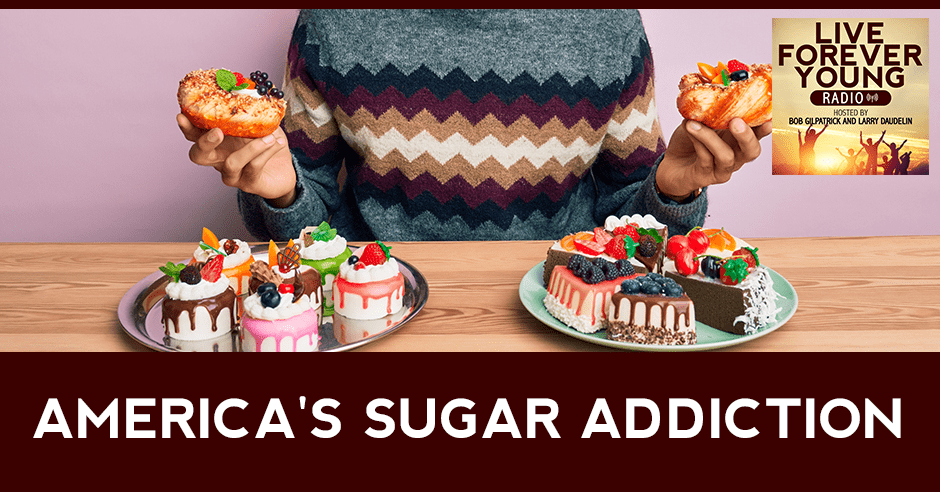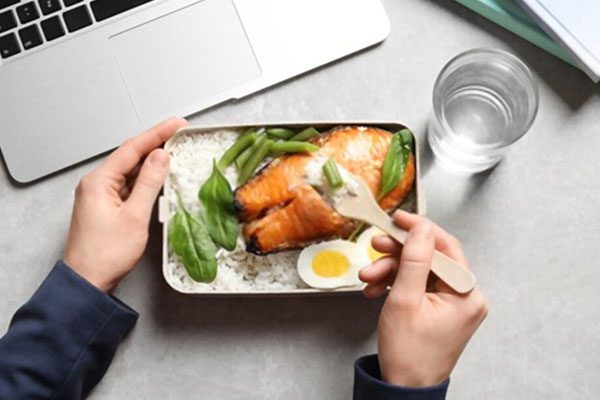America's Sugar Addiction

Do you know that approximately 75% of Americans eat excessive amounts of sugar — many of whom could be classified sugar addicts? In today’s show, Bob Gilpatrick and Rollie Culp discuss the close relationship between sugar addiction and drug addiction.
Plus, you’ll learn practical tips on how to restore your willpower and beat your cravings. Listen to this episode and discover helpful ways to decrease sugar intake, identify hidden sugars, and reduce cravings so you can avoid being overfed but malnourished. So sit back, relax and get ready to live forever young!
---
Watch the podcast here:
Listen to the podcast here:
America's Sugar Addiction
Extra Sugar, Extra Inflammation
Approximately 75% of Americans eat excessive amounts of sugar. Many of them could be classified as sugar addicts. In this show, learn the close relationship between sugar addiction and drug addiction share, and how to restore your willpower and beat those cravings. Bob and Rollie share some helpful ways to decrease sugar intake, identify hidden sugars and reduce cravings so you can avoid being overfed and undernourished. Sit back, relax and get ready to live for every young.---
Everyone, welcome to the show. I’m here with Rollie Culp. How's it going, Bob? Have you had your sugar fix before the show, so you have enough energy to get through this?
No, I haven't been eating sugar a lot. One of the things I don't seem to have too much of a problem with is sugar, but over 75% of Americans do. That’s what we're talking about now. It's America's sugar addiction. It causes a lot of issues with people's health. More than that, it can cause a lot of issues with relationships, too, because people get moody, depressed and anxious.
Ultimately, the problem with sugar, even though there are a lot of problems, is that sugar in excess causes inflammation. We know that inflammation is the cause of about 95% of all diseases.
When we start talking about diseases, many of them, the root is inflammation. When you think about all the things that inflammation causes, and you need to think about what happens when you take sugar in, it's no wonder why people who are sugar-addicted have lots of health problems.
Cardiovascular disease, the number one killer, certain types of cancers. Diabetes, like my dad. Problems with your liver, memory and focus. Even some studies show that it can lead to Alzheimer's disease. There's a lot of evidence showing cognitive decline and depression specifically related to sugar addiction because of what it does up in here. We'll get to that.
Also, have issues with low energy. People will eat sugar and then they'll get a little bit of a jolt of energy, then they have this big sugar slide. People get addicted to sugar because it's binding to receptors in your brain that are part of the reward system, the dopamine system. We know that if people are addicted to sugar and you look at a brain scan, it looks similar, and some say, even worse than if you're addicted to a hard drug like cocaine.
One of the things you'll see if you look at the brain scans between the relationship to people who are addicted to something like cocaine and sugar is those same dopamine receptors are dulled. There's no red in the middle there. It's only yellow and green. If you look at a healthy one next to a sugar-addicted or a cocaine-addicted brain, it looks different from a healthy one but similar in those two addictions.
When you look at why do people get addicted to sugar, first off, sugar tastes good. People start out by having experience when they're younger and they like sweet things, but all of a sudden, they have to have more. A big issue is drinking soda pop. People in the United States still get 25% of their calories from drinking soda pop. That doesn't even count other sugary drinks, sports drinks and other sweetened drinks.

Sugar Addiction: Cognitive decline and depression specifically relate to sugar addiction.
One of the things too that people don't realize is that a lot of the time, when you're standing in front of a vending machine, that's one of the decisions you don't want to make. Think about it. You're working all day long. You have kids. You have to figure out what time to get up, to take them and be to work. You have to figure out who you're going to call in the morning to let them know what's going on.
You've got a lot of decisions to make. What ends up happening is you get decision fatigue. It's like when you go home at the end of a long day and you're like, “Let's order a pizza. It's easier.” You don't have to worry about making that decision or the act of cooking. What you're talking about here is willpower. It is this measurable thing. Some studies have shown that it can be depleted. When it's depleted, you start getting this decision fatigue.
You make bad decisions and give in to temptation because you don't have the energy to do anymore. It’s like we talk about a show called Compassion Fatigue, where you're constantly giving compassion to others, then you get depleted and then you don't have compassion for when you need it, like for your child or if someone passes away, it's a normal thing.
It's the same thing with you wouldn't eat a half-baked, greasy pizza if you knew how bad it was, would you? Probably not, but you're tired that you don't care. You're not going to make that decision. You're going to let that decision happen. When that occurs is when a lot of people find themselves getting into a hard time with losing weight, keeping it off and eating healthy.
This goes hand in hand with sugar addiction. It's like being an alcoholic. How do you restore those depleted willpowers that you have? One of the things scientifically is glucose. Unfortunately, glucose helps and we don't want a bunch of glucose because we are trying to lower our sugar. What else can you do? You can meditate and pray. One of the things we talk about all the time, Bob, with the Inner Balance is gratitude.
When people get into this habit of eating too much sugar and they give in to it. The next thing you know, they're starting to have insulin resistance and then leptin resistance, which is supposed to be signaling your brain when you've had enough to eat. It's no longer creating that signal. Leptin and insulin are intertwined together.
One can inhibit the other. If people can start to break that habit of always eating sugary things, and one of the best ways to break a habit is to focus on gratitude. Especially if people are eating out of anxiety, they're feeling anxious, so they eat. It is tantamount to people believing that things are not okay. Gratitude's the opposite of that. It's hard to be anxious when you're focused on gratitude. If you're eating a lot of excess food and sugar because of anxiety, this is how it makes sense that gratitude is a good thing for you.
Another thing that's changed a lot since we've come into an industrialized revolution and industrialized age is we wouldn't eat personally. We would eat with the community. If you're living on a farm, everybody gets together in the morning, has a big breakfast, then around 3:00, they have an early dinner. They call it dinner, but it's late lunch. They'd eat something before bed but they'd share all the resources.
Nobody's eaten too much of one thing. Everybody's eating together. Any scarce resource or whatever you had available, you would eat together and make a thing. Now it's almost any time's a good time to eat. You get to work and there's a box of donuts or you go to the doctor's office and they've got donuts and coffee out. Even at the bank, you go there and you get a lollipop, sucker and whatever it is.
They have a round cylinder of pure cane sugar for your coffee. There are a lot of things and factors that make it hard to maintain that willpower. There are many hidden sugars, especially fructose. There are high-fructose corn syrup and a lot of things at the grocery store. That fructose is particularly bad for your liver. There are hundreds of thousands of people every year that are diagnosed with liver disease, with the result it came from too much sugar.
What can happen is you get scarring in your liver from overconsumption of fructose and it eventually blocks off the blood flow to the liver. About 1/4 of all the people that get this scarring from too much fructose end up needing to be considered for a liver transplant. It's the third leading cause of liver disease in the United States.
It's the type of thing that people need to understand, including when you consume too much sugar, this syndrome of insatiable hunger because you're eating empty calories. Your body is constantly craving good nutrition. It's saying, “I need more.” It's not like I'm waking up and getting fueled to go out and have a good day. It's like, “I'm hungry, I'm going to eat dinner. I'm still hungry, I'm going to get a bag of chips and now I'm ready for dessert.”
What happens is you're eating all day long because you're always hungry. You're malnourished at the same time and you have high inflammation. Therefore, you're at high risk for numerous different diseases. What we talked about is, what can we do about it?
The main thing that we want to do is figure out what we can do. One of the things that you can do is avoid the hidden sugars that we're talking about. Getting back to the insatiable hunger and how that works. The hormone leptin is supposed to tell you to stop eating, like, “We're full. It's time to go outside and do some work.”

JJ Virgin's Sugar Impact Diet: Drop 7 Hidden Sugars, Lose Up to 10 Pounds in Just 2 Weeks
That hormone can be blocked by insulin. It is the same hormone that tells the cells to open up and let all the sugar in, so we can go be active and have energy. When you are diabetic and you're suffering from insulin resistance, the insulin isn't opening the cells of the body to let the sugar that's in the body in, but what it's doing is blocking the leptin.
Glycating your proteins and creates that inflammation. How do we avoid stuff like that? We want to reduce sugar slowly because if you're addicted to something and you go cold turkey, it's impossible.
You’d have similar experiences if you were withdrawing from drugs. You probably won't be able to maintain it and you'll go right back. That's why you want to go slow and learn about where the hidden sugars are. Fructose is the most dangerous of the sugars, and it's in a lot of things. Almost anything you buy at the grocery store that's a packaged good, it's in the frozen food section, they'll have high fructose corn syrup that's in it and certainly, in the soda pops and other sugary drinks.
The easiest way to do it is to look at how much sugary drinks you have each day. Let’s say four. Some people drink a lot more than that but say you're drinking four drinks a day that would be considered sugary. The next thing you want to do is cut back by half for 3 or 4 days and then cut the other half so that now you're down from 4 until 3.
Take a week to do that because if you cut back all at once, that addiction's going to kick in and you're going to be right back where you started. You have to do it slowly. You also want to educate yourself about what are the highest sugar things.
For example, grapes are high in sugar. You wouldn't think that because they're a fruit and healthy but there is a lot of natural sugar in grapes. There is a good book that's called JJ Virgin’s Sugar Impact Diet. It's a book that shows you where all the hidden sugars are and what to replace certain foods that have high sugar.
You got to look for a replacement or something to take the place of that. One of the things that you want to do is avoid artificial sweeteners, because even though there is no sugar in them, they are sweet. When your body tastes the sweetness, it creates insulin to open up and let the sugar but there is no sugar because you're eating an artificial sweetener.
You're faking your body and now you're increasing insulin resistance because there is all this insulin that has nothing to do. The leptin that will tell you are full is at higher amounts. It's a vicious cycle. You've got to know how these things work together or else you're going to get caught in the middle of it.
Another thing is you can look at your ideal plate, what's your dinner plate going to look like. Let’s say you're going out for dinner. The first thing that people do is order a drink, “I'm going to have a martini, beer, or a glass of wine.” All of which is going to cause surprise in your blood sugar and then the next thing is they bring out the bread.
You've started out before you have ever eaten anything that’s good for you. You're already loaded up on sugar. It's time for dinner and you're going to have another drink with dinner. You're going to have some mashed potatoes, vegetables, meat, and then it's time for dessert. What happens is, by the end of your meal, way more than half of your calories were taken in from eating high-glycemic-index carbs.
That type of eating becomes a habit at home as well. If you are also using convenience foods, prepared foods, there are lots of high fructose corn syrup in those foods. Reducing sugar slowly is important. Paying attention to your plate and moving more towards good fats, lean proteins and less carbohydrates is going to help you to be on the beginnings of a semblance of a ketogenic diet.
One of the things you might want to think about doing is getting smaller plates. I was reading a study they did. It was an experiment. They had people come in and eat soup. One group of people had a regular bowl, filled it up, ate it. When they got towards the end, they asked them if they were feeling full. The person looked down, almost done.
They say, “I'm getting full.” In the second group, the bowl was rigged to where it would refill a little bit of soup every time somebody took a spoonful. They're sitting there and they're eating, about halfway done. Even though it's a full bowl soup, they would've eaten by now halfway through because it's been refilling. The person asked them, “Are they full?” They looked down at their bowl. They say, “No, I'm not even halfway done yet. How could I be full?”
The brain is easily fooled. There is a whole study of this. People will look at what colors of plates are the ones that will make people eat the most and the ones where you'll eat the least. A red plate has a subconscious connotation to stop.
People tend to eat less when they have a red plate. People will tend to eat less sugary foods and be satisfied depending on the music that is being played. Certain music makes you believe that your food is sweeter than it is. Restaurants use a lot of these techniques and you want to pay attention to a lot of that.
You can research all that. You can get the JJ Virgin’s Sugar Impact Diet. Another thing is in addition to changing slowly what you eat, you want to eat slowly.

Sugar Addiction: Pay attention to your plate and move towards good fats and lean protein.
We talked about this on Breaking Down Digestion, where you want to chew your food well, so the food is getting digested by the bacteria and the enzymes in your mouth. You're going to take your digestive enzymes with it, so that you can fully digest your food. The slower you eat, the less you're going to eat.
The reason is, from the time you're full, it takes a while for enough leptin to get to your brain to tell you you're full. Usually, people are full five minutes before the brain gets the signal. If you're eating slowly, taking breaks and putting your silverware down, you're going to feel full, perhaps when your plate still has food on it and you'll have eaten less food. If you're paying attention to what you're getting, you'll have had less sugar.
One of the main things is to become well-nourished. Eat foods that have real nutrients, vitamins and minerals. That's why a lot of people use supplements. We hear this all the time when people use our Gladiator Barley, the sprouted seeds, which are low-glycemic index when they're sprouts. They use Boomer Boost. Their body gets well-nourished that they eat way less food. We've heard people say that they now eat half as much food once they've gotten themselves well-nourished.
That means less groceries too. I've had people say they spend a lot less money on groceries because they don't eat quite as much food, and that's always a good thing. The one thing that I've heard is, “One foolproof way to elongate your life is to reduce calorie intake.” Increased nutrients and vitamins but decreased calorie intake.
In America, we've got a lot of high caloric food with not a lot of nutrients, vitamins and minerals, and that's why we have the issue we have with obesity and malnourishment. Being overfed but malnourished is what we say. Rollie, we also did a show on tapping on the Emotional Freedom Technique. People can use that to begin to reprogram themselves.
A lot of the times, it's a habit and you got to reset yourself. It's in your head. You can convince yourself using the tapping technique with affirmations to begin to reset how you think about food and how much you think you need to eat.
We have a video. Go to YouTube, search Boomers Forever Young. We have our own playlist called Emotional Freedom Technique or EFT. If you click on that, it'll go through the intro, the basics and then there are about 3 or 4 different ones. Tapping for weight loss, anxiety, depression is on there.
There's one more, but you'll have to find it to check it out. Immune System. Don't tell, them they got to look for it. Most importantly, there's one on tapping for weight loss. That's important. You can find it right there on that playlist. It's not a secret. Go to Boomers Forever Young YouTube. They're there.
Rollie, thank you very much for joining the show.
Thank you everyone for reading.
We'll see you at the next show.
Important Links:
- Compassion Fatigue - Previous episode
- Inner Balance - Previous episode
- JJ Virgin’s Sugar Impact Diet
- Breaking Down Digestion - Previous episode
- Gladiator Barley
- Boomer Boost
- Emotional Freedom Technique - Previous episode
- Boomers Forever Young - YouTube






Leave a comment